#les miserables novel
Explore tagged Tumblr posts
Text
There’s something about how Victor Hugo assures us that Monseigneur Bienvenue died peacefully by telling us his older sister stayed by his side until the very end. That, even after he went completely blind, she spent every night sleeping in the bedroom next to his, and spent every day taking care of him. And under his sister’s care, the blind bishop was more happy than he’d ever been in his entire life because “to be blind and to be loved is one of the most strangely exquisite forms of happiness . . . the supreme happiness of life is the conviction that we are loved; loved for ourselves— say rather, loved in spite of ourselves— this conviction the blind have. In their calamity, to be served is to be caressed . . . light is not lost where love enters . . . the soul gropes in search of a soul, and finds it.”
And then when first describing Grantaire, Hugo writes that the only thing the skeptic had ever dared to love was Enjolras, because “[n]o one loves the light like the blind man.”
And then Grantaire spends his final moments by Enjolras’ side, just like the bishop died by his sister’s side.
#monsignor bienvenue#grantaire#enjolras#enjoltaire#enjolras x grantaire#jean valjean#grantaire x enjolras#les mis#les miserables#les amis#les miserables novel#les miserables book#victor hugo#les mis victor hugo#les miserables victor hugo#e/r#ExR
727 notes
·
View notes
Text
No character will ever be as relatable as Marius Pontmercy in the musical adaptation of Victor Hugo's novel Les Misérables, where in the third line of the song "A Heart Full of Love" written and composed by Claude-Michel Schönberg and Herbert Kretzmer he sings "I'm doing everything all wrong."
#Closely followed by Marius Pontmercy in the novel Les Miserablés by Victor Hugo#Wherein in Book Eight: Chapter VI “Marius becomes practical once more to the extent of giving Cosette his adress”#Marius Pontmercy spends two hours banging his head against a tree#*#marius pontmercy#les mis#les miserables
306 notes
·
View notes
Text
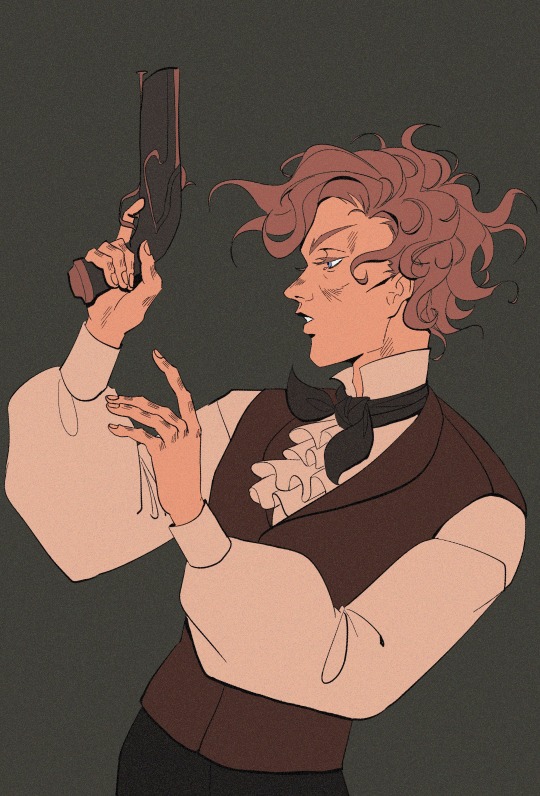
an enjolras because i miss him
#les miserables#les mis#enjolras#never forget your roots...#now that im done with my orv reread i want to reread lm bc one long sad book wasnt enough#dear les mis friends who may or may not be reading these tags. have you heard of omniscient reader#do you want to read a long long novel that will make you a bit sad.#with a protagonist thats kind of an everyman but also kind of not. who is a bit over self-sacrificing#and has an adoptive daughter#have you read orv. will you read orv. when will you read orv#i'll stop proselytizing now. goodbye
987 notes
·
View notes
Text
GOT THE REAL BRICK!

I LITERALLY FROZE LIKE A DEER IN HEADLIGHTS WHEN I SAW IT
#ITS THE FULL THING#NO MORE ABRIDGED HATE#ALL 1200+ PAGES OF GLORY#I GENUINELY COULD CRYYYYY#les miserables#les mis#the brick#victor hugo#book#reading#novel#les miserables book#ik it was the one when the first page i opened was grantaires 2 page yap session#love at first sight#omg#could cry rn
105 notes
·
View notes
Text

i need google ai overview to die i'm being so serious
#my favourite part of the novel les misérables was when enjolras spoke in only rhyming couplets#les mis#les miserables#enjolras#incorrect quotes#literally
39 notes
·
View notes
Text
"Authenticity" is hard to capture when adapting Les Misérables, because as @secretmellowblog, @pilferingapples, and others have pointed out, it was already a period piece when it was published, and Hugo used events of the past to address current social issues.
Hugo used the 1832 June Rebellion to comment on the 1848 Revolution and as a veiled call to arms against Napoleon III.
A century later, Boublil and Schönberg wrote the musical, and as @pilferingapples has said, they seem to have let the student protests of May 1968 (which took place in their youth) influence their view of the June Rebellion. Hence the lines in the musical that seem to paint it as a naïve endeavor by inexperienced schoolboys, which ignore the historical fact of the 1830 Revolution.
So what we see in the stage musical is 1832 through the lenses of 1848 and 1862, through the lens of 1968.
Then when the 2012 film version of the musical was released, Tom Hooper cited Occupy Wall Street as a source of inspiration. So what we get is 1832 through the lenses of 1848 and 1862, through the lens of 1968, through the lens of 2011.
Of course this just shows that the themes are always relevant. But if the real revolutionaries of 1832 were to see all of this, I'm sure they would point out some distortions in each new telling.
266 notes
·
View notes
Text
When I say "Victor Hugo's depiction of Jean Valjean's grief over losing Cosette is a reflection of Hugo's own grief at the death of his daughter" I'm not just theorizing-- some lines from Les Mis are basically just ripped word-for-word from Hugo's poems about the death of his daughter. Here are a few of them. Leopoldine drowned horribly with her husband only a few months after they were married; she was only nineteen. Jean Valjean's paralyzing fear of Cosette's marriage, his misguided useless rage at her husband, and his violent grief over losing her and never being able to see her again, is heavily influenced by Hugo's own grief. I have trouble finding good English translations of some of Hugo’s Leopoldine poems online, and would appreciate better links to English translations if anyone has them. But In A Villequier, one of Hugo's poems addressing God with furious grief over the death of Leopoldine, he writes:
Consider again how I have, since dawn, Worked, fought, thought, walked, struggled, Explaining Nature to Man who knew nothing of it, Lighting everything with your clarity; That, facing hate and anger, I have done my task here below, That I could not expect this wage, That I could not Foresee that you too, on my yielding head, Would let fall heavily your triumphant arm, And that you who saw how little joy I have, Would take my child away so quickly!
Which is almost word for word just Jean Valjean's:
I have left my blood on every stone, on every bramble, on every mile-post, along every wall, I have been gentle, though others have been hard to me, and kind, although others have been malicious, I have become an honest man once more, in spite of everything, I have repented of the evil that I have done and have forgiven the evil that has been done to me, and at the moment when I receive my recompense, at the moment when it is all over, at the moment when I am just touching the goal, at the moment when I have what I desire, it is well, it is good, I have paid, I have earned it, all this is to take flight, all this will vanish, and I shall lose Cosette, and I shall lose my life, my joy, my soul....
And this from the same poem:
I keep seeing that moment in my life when I saw her open her wings and fly off! I will see that instant until I die, the instant, no tears needed! where I cried: the child I had a minute ago— What? I don’t have her any more?
Is a similar sentiment to this angelic description of Cosette “taking flight” away from Jean Valjean:
Cosette, as she took her flight, winged and transfigured, left behind her on the earth her hideous and empty chrysalis, Jean Valjean.
And the moment when Jean Valjean realizes she’s in love with Marius, and has been “lost” to him without him realizing it:
The unprecedented and heart-rending thing about it was that he had fallen without perceiving it. All the light of his life had departed, while he still fancied that he beheld the sun.
This from the poem Demain dès l'aube, where Victor Hugo describes visiting Leopoldine's grave:
I will walk with my eyes fixed on my thoughts, Without seeing anything outside, without hearing any noise, Alone, unknown, back bent, hands crossed, Sad, and the day for me will be like night.
And Jean Valjean walking to Cosette's house, but never able to enter or speak to her:
There [Jean Valjean] walked at a slow pace, with his head strained forward, seeing nothing, hearing nothing, his eye immovably fixed on a point which seemed to be a star to him
This bit where Hugo talks about his faith weakening/cursing God in vain after Leopoldine’s death:
Consider how one doubts, O God! when one suffers, how the eye that weeps too much is blinded, how a being plunged by grief into the blackest pit, seeing you no more, cannot contemplate you.
Is similar to Jean Valjean’s spirtual self weakening and his consience “taking flight” at the idea of losing Cosette:
Any one who had beheld his spiritual self would have been obliged to concede that it weakened at that moment. (...) Grief, when it attains this shape, is a headlong flight of all the forces of the conscience. These are fatal crises. Few among us emerge from them still like ourselves and firm in duty.
Victor Hugo agonizing over his dreams of growing old with his daughter in A Villequier:
You make loneliness return always around all his footsteps.(...) As soon as he owns something, fate takes it away. Nothing is given to him, in his speedy days, for him to make a home and say: Here is my house, my field and my loved ones!
Jean Valjean:
“As one family! No. I belong to no family. I do not belong to yours. I do not belong to any family of men. In houses where people are among themselves, I am superfluous. There are families, but there is nothing of the sort for me. I am an unlucky wretch; I am left outside.
Victor Hugo's poetry in A Villequier again:
in the midst of cares, hardships, miseries, and of the shadow our fate casts over us, how a child appears, a dear sacred head, a small joyful creature, so beautiful one thinks a door to heaven has opened when it arrives; when for sixteen years one has watched this other self grow in loveable grace and sweet reason, when one has realized that this child one loves makes daylight in our soul and in our home,
Jean Valjean:
this man, who had passed through all manner of distresses, who was still all bleeding from the bruises of fate, (...) merely asked of Providence, of man, of the law, of society, of nature, of the world, one thing, that Cosette might love him! That Cosette might continue to love him! That God would not prevent the heart of the child from coming to him, and from remaining with him! Beloved by Cosette, he felt that he was healed, rested, appeased, loaded with benefits, recompensed, crowned. Beloved by Cosette, it was well with him! He asked nothing more! Had any one said to him: “Do you want anything better?” he would have answered: “No.” God might have said to him: “Do you desire heaven?” and he would have replied: “I should lose by it.”
Victor Hugo begging God to talk to his daughter again:
Let me lean over this cold stone and say to my child: Do you feel that I am here? Let me speak to her, bent over her remains, in the evening when all is still, as if, reopening her celestial eyes in her night, this angel could hear me!
Jean Valjean thanking God for letting him speak to Cosette one more time:
The good God says: “‘You fancy that you are about to be abandoned, stupid! No. No, things will not go so. Come, there is a good man yonder who is in need of an angel.’
I think the ending of Les Mis never made complete sense to me until I realized that Jean Valjean isn't grieving like a parent who has watched their child grow up; he is grieving like a parent who has just watched their child die.
#lm 5.9.1#les mis#les mis letters#i was originally going to make a joke like#men will literally spend 30 years writing les miserables instead of going to therapy#but also reading Hugo's Leopoldine poems even when the translations might be imperfect is just. agh. :_;#and also has radically shifted my entire perspective on the novel and Jean Valjean
146 notes
·
View notes
Text
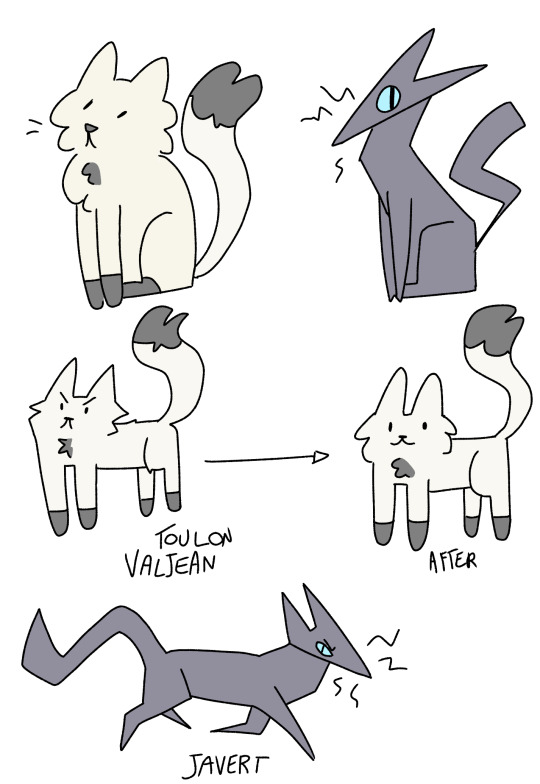

Remember those les mis doodles i was talking about? Here they are, have fun with cat!Valjean and cat!Javert. Also Javert holding a cat because i feel like it would solve a lot of his problems
Original doodles under the cut


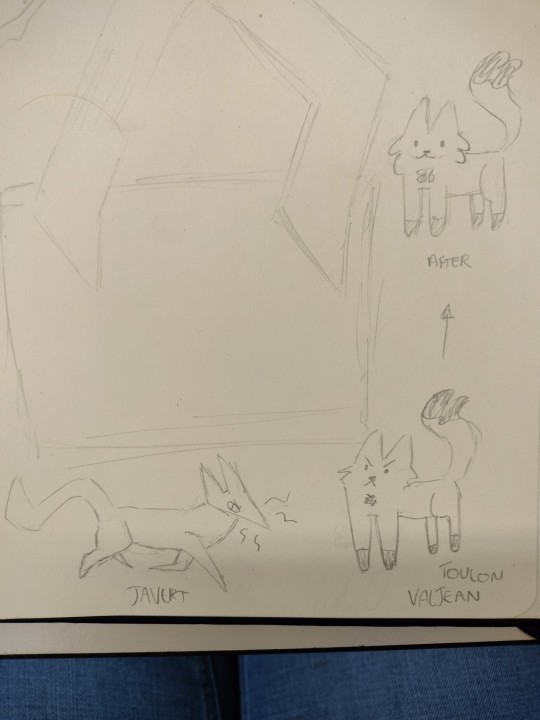
#les mis#les miserables#jean valjean#javert#cat!valjean#cat!javert#istg i will make a cat les mis graphic novel someday#have fun with these doodles yall
85 notes
·
View notes
Text

"Life is a hideous invention of I know not whom. It lasts no time at all, and is worth nothing. One breaks one's neck in living. Life is a theatre set in which there are but few practicable entrances. Happiness is an antique reliquary painted on one side only." - Victor Hugo, Les Misérables
Photography by Kyle Thompson
#literature#quote#reading#writing#book#novel#author#writer#books#classics#french literature#victor hugo#les miserables#les mis#art#artist#photography#kyle thompson#life#living#happiness#room#balloon#red
7 notes
·
View notes
Text
Laura Kalpakian’s Cosette (1995)
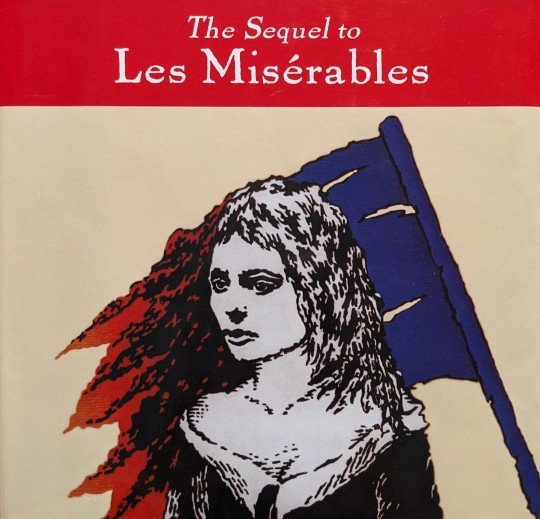
All I really knew about this book before reading it was the "This is a nipple line" (and if you don't know what that is, we will get there) so my expectations were not high. But I will say I enjoyed it, not as a sequel to Les Misérables but as a wild ride from start to finish. And thank you to @cepholliepod for getting it for me. Now, if you are up for it, see below the cut for a detailed plot summary!
The book starts by rehashing the last two volumes of Les Miserables and inserting the author’s original characters such as Eugène Verdier, a printer who escapes from the barricades by wearing a National Guardsmen's uniform and Victor Pajol, Verdier's apprentice. We are made to think that Pajol dies on the barricades but he is actually in jail for years (make note of that). While in jail he is visited by Achille Clerons. Clerons had also been at the barricades. In fact he was the fifth man who left the barricades, the man wearing Jean Valjean's National Guard uniform. Pajol learns that Clerons was actually a spy in league with Javert and who is still looking to track down Verdier and Marius. Right away you start to get a feel for the author’s interesting word choice, such as when Eponine dies "with a raucous gurgle that sounded as if the life were being brutally sucked, not merely drained from her body." Or when Javert tells Enjolras "One day more and you'll piss blood. I'll meet you in hell." (Sometimes a line like “one day more” just smacks of the musical.) I personally really enjoyed the part when the sergeant guy tells the insurgents “no one is coming to help you to fight!" and Marius asks the insurgents if they remember Cambronne’s response to the English at Waterloo and so Enjolras yells “merde.” The other purpose of starting this book prior to the conclusion of Les Misérables is to insert some sex appeal. We learn from the very first page that Cosette doesn’t want to go into “celibate exile,” she wants to have sex asap and she is willing to do it before getting married and she writes as much in her letter to Marius. As we know, they do get married and that leads us to the infamous wedding night scene. Suggestive cream-colored wax is flowing from the candles by their bed. Cosette asks Marius to teach her anatomy and Marius begins with “This is a nipple.” Yes, “this is a nipple” is real but the context makes it worse, which is that he named the nipple "much as an old explorer might name some new land, some heretofore unseen country." Okay, so he is colonizing her body? Sex, love, and colonization are a running theme throughout the book. See for example: "They made voyages of discovery on the great galleon of their bed." Marius and Cosette constantly refer to their relationship as its own country which is threatened by the world. Besides Marius and Cosette fucking (which they do at every opportunity throughout the book), there are also a lot of dogs copulating in this book. Dogs get mentioned a surprising amount and when they do, they are always going at it.
Fun fact: we learn that Jean Valjean’s true passion all those years in the convent was the cultivation of a rose the color of Cosette’s eyes, which are blue. Which he eventually achieved. Later we learn that when Haussmann tore down the convent, Jacques Offenbach saved the blue rose and it became wildly popular during the Second Empire. Then, after Jean Valjean dies, Marius starts a radical newspaper called La Lumière at Cosette's suggestion and with Cosette's dowry money. Marius is committed vaguely to the ideals outlined in the preface of Les Mis and is arrested 67 times. When Marius is in prison, they will bribe the guard to let Cosette in so that they can fuck (and so that Cosette can smuggle out Marius’s writing, which she finds very erotic.) Verdier works for the paper and so does Clerons (his spying is the reason for Marius’s many arrests). Pajol eventually finds Marius and Clerons’s cover is blown. Theodule also works for the paper, but he is called Cousin Theo and he is dumb and only works there because Marius takes pity on him. Everyone agrees he has no talent. Marius and Cosette both write for La Lumière but Cosette's main conflict for the first half of the book is that she loves her husband more than she loves politics but she isn't sure if he feels the same. Cosette is shown to not really understand the plight of the poor and really seems to just follow her husband's political opinions. She is very insecure and begs Marius never to leave her. They have two children. Jean-Luc Pontmercy is their first, named after Jean Valjean and Luc-Esprit Gillnormand although I think we all can agree that he should have been named Jean George instead. He is simply a terrible child who grows up to be a terrible man. We don't really learn if this is because Cosette and Marius made some mistake raising him; he just seems inherently bad. The one person who really likes him is Aunt Gillenormand but for some reason, she is named Aunt Adelaide. She forgets about Theodule and devotes herself to Jean-Luc even though he is terrible. He sleeps with grisettes and passes notes in class (the contents of the notes seem to be important but they never are). Jean-Luc falls in love with an aspiring actress named Nicolette Lauriot. He wants to marry her but he has no money or parental support Marius and Cosette’s second child is Fantine Pontmercy. She seems to be inherently good, although she is a bit of a brat at first and mostly mopes around complaining that girls can't do anything. Cosette told Marius that "Fantine" was the name of a childhood friend because she was afraid to tell him that her mother was a prostitute named Fantine. When Marius eventually finds out the truth about the origin of their daughter's name years later, he isn't even mad and agrees with Cosette that she was right to hide it from him. Cosette also sort of adopts a gamin named Gabriel Lascaux. She saves him when he is caught stealing bread and gives him a job at La Lumière. We learn that his mother is a registered fille publique and his father is a convict. It kind of seems like the identity of his father might be important since it keeps coming up but it never is. Fantine and Gabriel fall in love despite their differences in upbringing.
Gabriel’s maternal grandmother is The Countess Crasseux aka the Changer aka Dahlia Drion and yes, she is OG Fantine's friend Dahlia. She makes a business in the underworld supplying people with fancy clothes and disguises. She initially doesn't like Cosette's influence on Gabriel but she eventually realizes that Cosette isn't just a stuffy bourgeois woman, that she is Fantine's daughter, and the two become friends.
(Side note: In December of 1832 the mômes were adopted by Dahlia and they work for her. They are known as the Jondrettes. They are selectively mute and only communicate with each other.)
Next comes 1848 and February Revolution, and the characters discuss liberté, égalité, fraternité so much that you would think it was the only issue in French politics (and a vague one at that.) Marius and Cosette are disillusioned by the brutal suppression of the June Day uprisings. Cosette is frightened when she sees Marius running to the barricades with a look in his eye that she only ever sees when they have sex and this makes her more insecure. Marius and Gabriel are arrested for demonstrating and Cosette appeals to Thiers to get them out. Yes Adolphe Thiers, future president of France, is a character in the story. Cosette must promise that La Lumière will support Thiers in the upcoming presidential elections but for some reason that literally never is relevant again. (Side note: My favorite chapter in the book was an aside which described the paintings done of the Pontmercy family in this period by an artist employed by La Lumière, and which included where you could view those paintings today (as if they were real). There were also some fun epistolary chapters.) Anyways, in the election La Lumière supports Louis-Napoleon for president, which brings us to our next character. Napoleon III: Yes he is a character too. He reads La Lumière and personally comes to Marius and Cosette's house to ask for their support. Oh and also he HAS A CHILD WITH AZELMA THENARDIER. Yeah, while he was in exile in America he met Azelma and they had a child together, named Eponine-Hortense (Hortense was the name of Louis-Napoleon's mother). Azelma was not successful in America, though she did own one slave. Then it is 1851 and Napoleon III stages his coup d’etat. When Azelma reads that the father of her oldest child has become Emperor, she returns to France with her husband and children. Because Napoleon III acknowledges that Eponine-Hortense is his, Azelma becomes rich and influential. She is known as the Countess Troussebois. Meanwhile, the police are looking for Marius and Cosette to arrest them because of their political activities. They have a deus es machina opportunity to escape to England but Marius won't go. So Cosette learns that he does value his political ideals over their relationship but there's really no fallout or conclusion from this, she just decides that if he is going to the barricades, she will go with him. Remember how they always said that their love was it’s own country?? Cosette concludes that Marius is equally devoted to that country as he is to France but that she is only native to the country of Love and for that reason she follows him to the barricades. Also Jean-Luc betrays his parents to the police, Marius tries to convince the army not to participate in the coup, and Marius is killed. Actually, Marius is not killed. He is actually in prison, like Pajol was earlier. But Cosette doesn't know this and she lives disguised as a beggar for years. Here we spend a lot of time with "les misérables" and they all have nicknames, such as les Genoux, Toutes-Nations, the Ark, and the Captain. (Side note that Kalpakian seems to like unconventional names quite a bit, as she named her own son Bear.)
We see how and where les misérables live (especially with the Haussmannization of Paris), and only when Cosette lives among them, lives like Jean Valjean and Fantine lived, in dire poverty, do Cosette's politics develop. She writes anti-Napoleon III political pamphlets (The Toad Napoleon and Bonapoleon) and publishes them with the help of Pajol (Verdier was killed alongside Marius but for real). One of the main themes of the book is that you can’t change who you are on the inside (there is this story to that effect called “The Costly Omlette” which is mentioned many times). Cosette is given many, many nicknames, such as the Plumed Lark, la Mauviette, the Vegetable, the Oyster, Foundling, and Mea Culpa but Cosette’s most important journey is that she learns to connect to her childhood identity as “the Lark” and her legacy as the child of Jean Valjean and Fantine but that is a generous interpretation.
Eventually, Cosette learns that Marius is alive and she and Gabriel break him out of prison by dressing Marius as a woman. Cosette and Marius are close to starving to death because unfortunately, Clerons is still chasing after them. However, they are saved by the help of Nicolette. Remember Nicolette? She became the most successful actress of the Second Empire. She wouldn’t marry Jean-Luc though, and she said to him: “I am not some small savage country to be conquered by one man…I don’t want to be colonized…You want to colonize me.” Maybe if Cosette and Marius represented the future of France at the end of Les Mis, Nicolette is here to spread an anti-colonization message...no I think that’s too much of a stretch.
Anyways, Jean-Luc marries Eponine-Hortense for her money (Azelma arranged the marriage because she knew she could control him and therefore her daughter and because she wanted revenge on Cosette). Jean-Luc and Eponine-Hortense have a child named Louise. She is named after her godfather, Louis-Napoleon Bonaparte. Azelma brags to Nicolette about her scheme, revealing her shared childhood with Cosette like an evil villain, and Nicolette sympathized with Cosette because she also came from poverty. Therefore she gets Cosette a job in the theater (where Cosette is able to hide Pajol in the basement a la Phantom) and hides Marius at her house. Also Nicolette is pregnant with Jean-Luc’s child.
Meanwhile, slight tangent, Clerons is also looking for Gabriel. Fantine, who had been living in exile for years comes back and lives with her brother because she wants to find Gabriel also. Jean-Luc is furious about their relationship. However, he tells her that she and Gabriel can bop in the basement. Weird but Fantine wants to fuck SO badly that she goes for it. She lets up the room (Jean Valjean’s candlesticks are there) and invites Gabriel over but it’s a trap! Clerons barges in before they can get down to business. Fantine hides Gabriel under her giant skirt and when Clerons finally leaves, Gabriel goes to town down there and Fantine utters “moist cries of freedom.”
Back to the plot. Nicolette is in a hit play and Napoelon III wants to have sex with her. She does it, just to get the scoop on what sex with the Emperor is like and she, Marius, and Pajol think that Cosette should write a pamphlet about the Imperial member. Despite her reservations, Cosette writes a pamphlet called Tadpoleon. Although the pamphlet is very funny, it has no political impact and, worse still, Clerons goes through Napoleon III’s sex calendar and connects the dots between the pamphlet and Nicolette and Nicolette to the the author of the pamphlets (who he knows to be Cosette because she used the alias "La Lumière.”)
Knowing that his mother and former lover are about to be captured, Jean-Luc goes to the theater. In the middle of the act, Napoleon III’s soldiers storm backstage. Nicolette and Cosette hide in the dressing room. Jean-Luc is there. They tell him that they hate him. Clerons bursts in. Nicolette lights a fire. Pajol pops out of his hiding place and sacrifices himself so that Nicolette and Cosette can get away. The theater burns down while the rich people in the audience applaud, thinking it is part of the show.
Then there’s an epilogue (because of course there is). Cosette and Marius own an inn. They are raising Nicolette’s daughter while she performs in England. Fantine and Gabriel have a child have a child together. Jean-Luc shows up. He wants to be forgiven. Marius says that he can forgive because Jean Valjean forgave (although the things Jean-Luc did were way worse than anything that Marius did tbh). Cosette doesn’t forgive him (yet). The End.
Now simply, with no context, I will share some of my favorite lines:
“All young men are hard.”
“Go shit yourself, bourgeois pig.”
“Sucking your short cock? Merci, no.” (The character always say merci no, merci yes.)
“You will hang by your cock in hell.”
“Cosette teased Marius that he loved the sea because it was as gothic and unpredictable as he was.”
“Those with penises were for Bonaparte.”
“The turnip seller grasped two of her wares high overhead and waved them about, crying out lyrical comparisons between the size of her turnips and the balls of the men who ate them. A juggler’s balls spun high in the air, and given the thin, flappy garment he wore, no doubt his other balls contracted with the cold.”
Clerons: “Everyone knows the pen is truly, well, the ‘male member.’” Cosette: “That explains why it grows in women’s hands.”
“I need the Priest. I am the Monkey.”
“He could, as they say, strike the pose.”
“Jean Valjean had gone through the sewers to save Marius; what did Cosette care if she had to beg Adolphe Thiers?”
“The gulls’ cries drowned out the sounds of Marius and Cosette making love…Marius [was] careful to bring Cosette to that high clear peak, that vanishing pinnacle, moments before he went there himself.” (Good for him.)
“Louis-Napoleon sat down gingerly, the caution of a man who suffered pain in his testicles.”
Maybe I’m a bit immature me but you have to admit, that’s a lot of balls being referenced.
89 notes
·
View notes
Text
A list of Les Mis headcanons I have because of fanon characterizations. I tried to keep out things that are suggested in canon or in adaptations. So:
-Les Amis are anticapitalist and they believe there is a class war. In the novel they look like radical republican -EDIT: I mean pro Republic and obviously NOT the American Republican- and socialdemocratic more than real socialists (except for Bahorel probably) but the fandom made them totally red and I embrace this headcanon.
-Jean Valjean will be saved and will never be estranged from his daughter. His last plot doesn't exist in none of my headcanons and I'm glad the fandom ignored it as well. They have a strong and healthy relationship. Marius will respect that or he will fuck off.
-Javert can and will be saved
-Reincarnation for every character.
-R is an artist. In the brick he dumped Art but I share the fanon vision of Grantaire being very fond of every art in canon era and also doing graphic design in modern era. He can be bitter about it tho.
-R is actually helpful once in a while.
-R IS NOT a misogynist in modern AUs and is also friend with several women. Musichetta is a good match, because if his closeness with JB, but also Irma and Floreal, subverting the canon dynamics. Eponine too. He's smart and he thinks a lot about systemic oppression so I agree he would be sympathetic to women in 2023. BUT I don't overlook R's misogyny in canon era.
-Grantaire and Eponine would get along very well, especially if the age gap was eliminated in AUs.
-Jehan has a gender non conforming style. Long hair for sure but also traditionally feminine clothing in his wardrobe, like skirts.
-Enjolras cares about Grantaire. This one may seem born in adaptations but imho fanworks got to it before musical productions.
-Courferre
-Eponine, Cosette, Musichetta are relevant in modern AU ABC plots.
-I love bi Cosette! Zero hints in the novel but it would be neat.
-If the scenario hasn't to be strictly canon compliant, Les Amis survive, take a while to heal and then they reprise the struggle.
#les miserables#les amis de l'abc#les miserables headcanons#les amis headcanons#enjolras#grantaire#combeferre#jean Valjean#cosette#javert#jehan prouvaire#enjoltaire#queer headcanons for les amis are not in this list because honestly there is a lot of les amis queercoding in the novel#the same applies to jvj and javert
159 notes
·
View notes
Text
Just came back to say:
HEY! EVERYONE THAT WRITES LES AMIS MODERN AU! IN NEW YORK!
You should read Radical: My Year With A Social Senator by Sofie Warren and look at Radical Justice: Lifting Every Voice by Accra Shepp (this one is very hard to get, but if you're able to find it at your library or to pirate it you're golden. It partially focuses on Occupy Wall Street which is so rare actually)
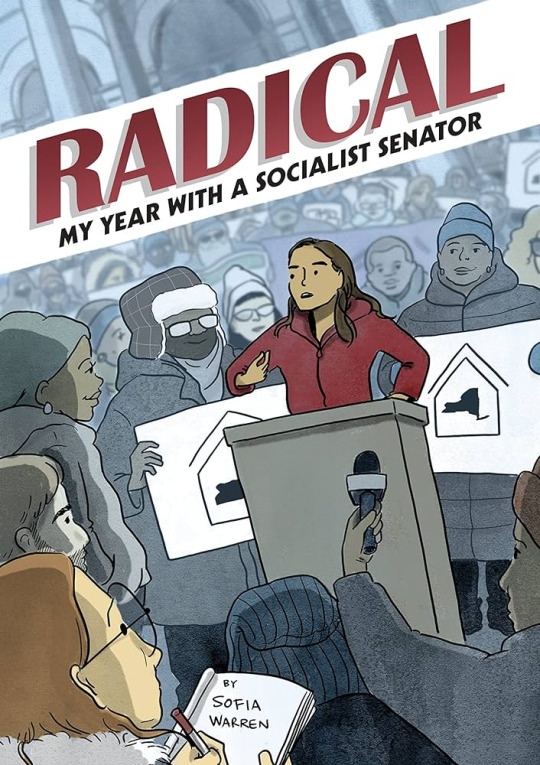
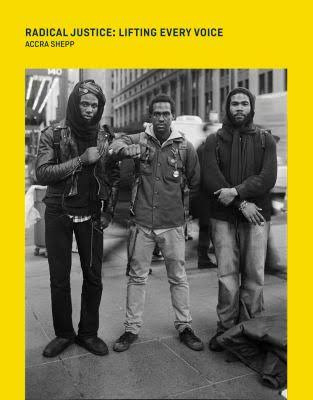
Even if you dont!! These are very good texts that creatively show the reality of protest in New York. Warren's book is a graphic novel. Shepp's is a book of photography.
#les miserables#les mis#sofie warren#les amis de l'abc#les amis#i just read the graphic novel and i really did love it#it's got a few iffy places but overall is very informative
42 notes
·
View notes
Text
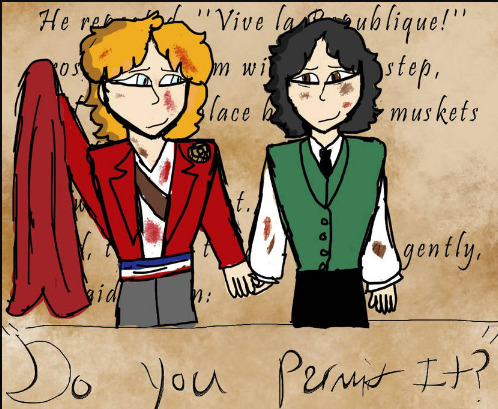
Woke up feeling Enjoltaire-y, made this.
Based on the 2012 movie and the book <3.
#broadway#les miserables#aaron tveit#les mis#les mis 2012#george blagden#fanart#les mis fanart#les amis de l'abc#literature gays#classic lit gays#les miserables movie#les mis novel#les mis book#the brick#enjolras#grantaire
21 notes
·
View notes
Text
"The power of a glance has been so much abused in love stories, that it has come to be disbelieved in. Few people dare now to say that two beings have fallen in love because they have looked at each other. Yet it is in this way that love begins, and in this way only."
- Victor Hugo , Les Misérables
#victor hugo#les miserables#words#writing#poetry#tumblrpost#literature#quotes#relatable#art#dark academia#lit#quoteoftheday#spilled truth#spilled love#books and quotes#november#books and novels#writing community#poets on tumblr#quotes to live by#quotes to remember#about love
38 notes
·
View notes
Text


" Give that letter to me, mademoiselle. I'll take it to him. "
69 notes
·
View notes
Text
Out of sheer curiosity, I thought I'd start a poll to learn how exactly the Les Misérables fandom thinks the novel's Fantine is killed by the emotional shock Javert inflicts on her.
"She was too sick and weak to bear the shock" has always seemed like a clear explanation to me, with either heart failure or a lung aneurysm both sufficing as possible realistic explanations.
But as I've looked online, I've seen a few people assume that the shock merely makes her collapse and that her head striking the headboard of the bed is what kills her.
I've also seen two people assume that despite Valjean telling Javert "You have killed this woman," her death has nothing to do with the shock – she would have died at that moment anyway, it just coincides with Javert horrifying her.
I'd like to see which readings are the most popular.
56 notes
·
View notes